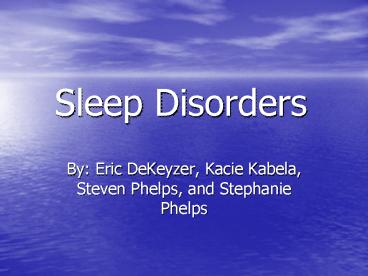Sleep Disorders - PowerPoint PPT Presentation
1 / 20
Title:
Sleep Disorders
Description:
Cause by the mismatch between the body's internal circadian rhythm and the phase ... Night mare, where mara means to crush. Frightening dream awakening the sleeper ... – PowerPoint PPT presentation
Number of Views:33
Avg rating:3.0/5.0
Title: Sleep Disorders
1
Sleep Disorders
- By Eric DeKeyzer, Kacie Kabela, Steven Phelps,
and Stephanie Phelps
2
Jet Lag
- Cause by the mismatch between the bodys internal
circadian rhythm and the phase of the local
nychthemeral time. - 1/3 of people do not seem to be affected. It can
range in severity from mild to strong. - Symptoms last for a few days and include sleep
disturbance, daytime tiredness, reduced
concentration, slower reaction time,
irritability, and general disorientation.
3
Jet Lag
- It can contribute to travel paranoia
- When traveling eastward there is difficulty
falling asleep, and when traveling westward there
is early awakenings. - Jet lag is greater when traveling east than west.
4
Jet Lag
- Take 1 recovery day for each time zone crossed
west and 1 and ½ days when east. The occurs
because the circadian rhythm insists on delaying
rather than advancing. - Keep to the times of the area, such as eating,
sleeping, and generally being active. - Melatonin can also help.
5
Daylight Savings Time
- Spring ahead (spring) vs. fall back (fall)
- Lose one hour of sleep
- Sleep deprivation
- Change in sleep patterns
- Affects Circadian Rhythm
6
Snoring
- Results of the narrowing of the air passages
during sleep, allowing the soft palate to vibrate
- Results in low oxygen levels and high blood
pressure - Worsened by obesity, alcohol, smoking
- Not all people who snore have sleep apnea, even
though those who have sleep apnea snore
7
Shift Work
- Working anytime other than day or night
- Rotating between working during the day and at
other time
8
Shift Work Difficulties
- People over 50
- Morning types
- Long sleepers
- Those with chronic illness or sleep disorder
- Average shift workers get 5-7 hours less of sleep
a week
9
Sources of Problems
- Poor quality and quantity of sleep
- Disrupted circadian rhythms
- Trying to sleep when circadian rhythm tells them
to be awake - Just get circadian rhythms synchronized with
current shift and then switch to another - Those who work permanently work the non day shift
often assume a day sleep awake pattern - Domestic/Social problems
- Pressure to do other things during the day than
sleep
10
Poor quality and quantity
- Sleep is fragmented by arousal
- Results
- Social isolation
- 57 higher divorce rates
- More negative moods
- More emotional problems
- Higher incidence of sleeping disorders stomach
and intestinal problems, and cardiovascular
illness
11
Treatment
- Teach shift workers about good sleep hygiene
- Maintain bright workplace, very dark sleeping
place - Use sleeping pills if neccessary
12
Nightmares
- Nightmare, where mara means to crush
- Frightening dream awakening the sleeper
- Full alertness upon awakening
- Moderate increase in heart rate and breathing
rate - Usually occur 10 minutes into a REMS episode
during last half of sleep period
13
Bad Dreams (Anxiety Dreams)
- The person does not awaken during dreams, but
recalls the disturbing content upon awakening
later - Important factor is whether the nightmare or bad
dream has a negative effect on waking life, not
whether the person is awakened during the
experience
14
Bad Dreams cont.
- Frequent between 3 and 8 years of age
- Mostly reported during times of crisis, loss, and
trauma.
15
Night Terrors
- Child partially arouses suddenly from SWS and
emits a piercing scream, which theyre sitting
up. - Eyes may be wide
- Racing heart
- Breathing rapidly
- Little or no recall the next morning
16
PTSD Nightmares
- Repetitive re-experiencing of traumatic event
- Occur during any sleep stage and more likely in
early night. - Cause of sleep disruption including more
awakenings, fear of sleep, and various changes in
REM. - Person is confused and anxious but not always
remember the entire nightmare.
17
Sleep Talking
- Lasts for a few seconds
- Occur during stage 2 and only 10-20 during REMS
- It tends to occur more frequently among related
family members, but is considered benign and
therefore not treated.
18
Sleep Walking
- Begins during SWS, not REMS, typically occurs in
the first half of the night. - Results in little if any dream recall and can
induce in the predisposed by forced arousal - Best thing is for the child to grow out of it.
- Reduce things that trigger events, such as stress
and sleep deprivation
19
Sleep Walking cont.
- If extreme
- Psychological treatment
- Relaxation therapy
- Stress management skills
- Hypnosis
- Medications
20
Bedwetting
- Parents control by trying several training
methods involving gentle alarms - Can be indicated as psychological and
neurological problems































